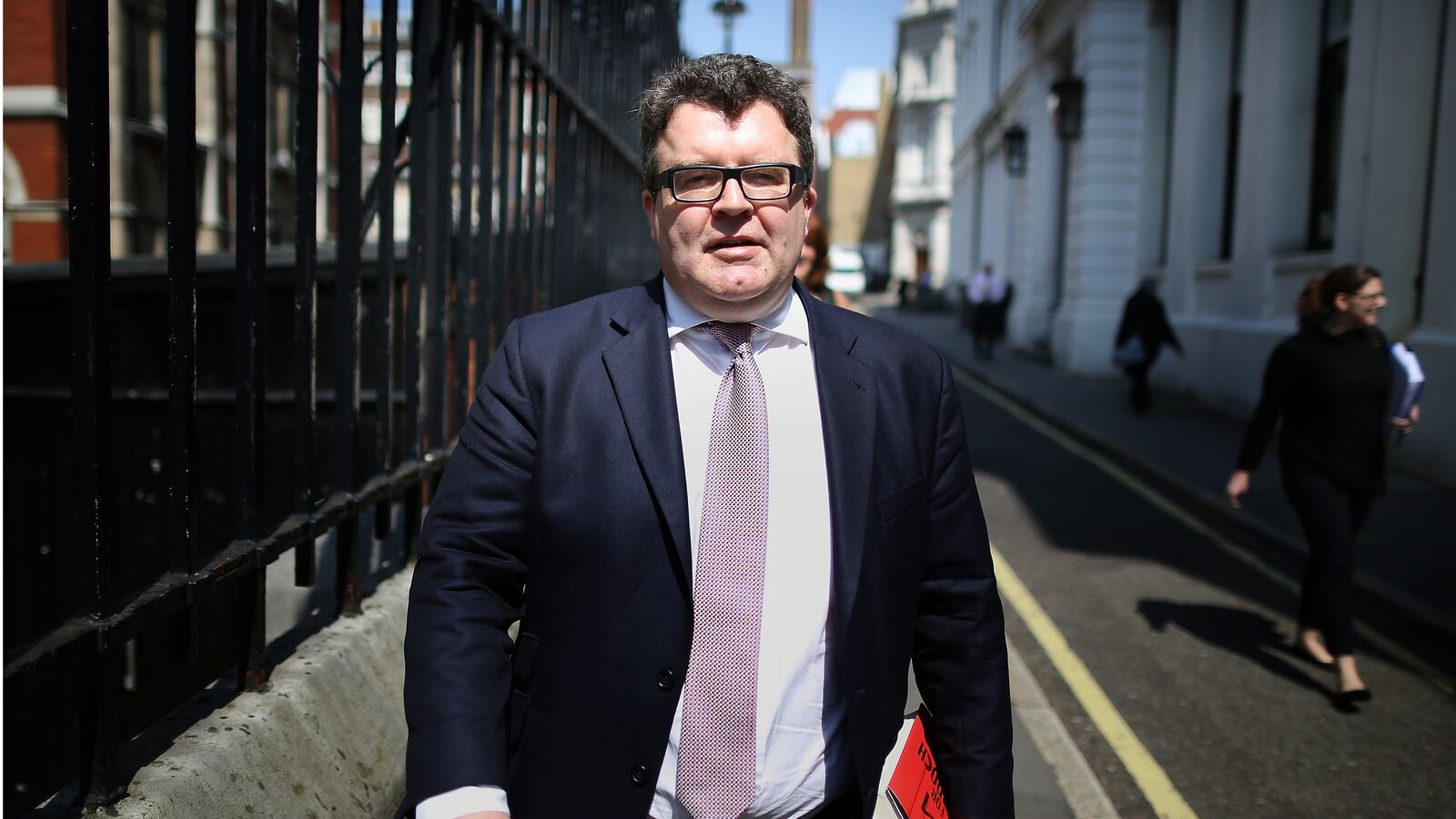What stopped this coming out a decade ago?
Hot on the heels of the Jimmy Savile scandal, in which one of Britain’s most high-profile pop celebrities was alleged to have been a prolific perpetrator of sexual abuse, allegations of an even more disturbing pedophile ring with connections to the highest ranks of government have come to light.

Two weeks ago, Britain was still reeling from news that Sir Jimmy Savile, friend to Margaret Thatcher and Prince Charles, had allegedly abused up to 300 minors during his 50-year TV and charity-fundraising career. During prime minister’s questions on October 24th, the campaigning Labor MP Tom Watson rocked the House of Commons by airing allegations from child-protection professionals of a "powerful pedophile network linked to Parliament and No 10.”
Watson’s co-author of Dial M for Murdoch, Martin Hickman, told The Daily Beast on the eve of his parliamentary statement “this is much darker and more disturbing than phone hacking … We have no idea where it will go."
Now it seems this story will run and run. Within days, Steven Messham, one of the alleged victims, went on camera on a BBC Newsnight documentary to say that he and other children were sexually abused on a regular basis at a care home by a circle of men that included a leading Thatcher-era politician during the 1970s and 1980s. Messham claimed to have been raped by the senior political figure at least a dozen times, and his accusations were echoed by anonymous victim, who told Newsnight that in 2000 he was abused by the same man. On Sunday, The Daily Telegraph reported that the politician at the center of the accusations denied he had ever been to the care homes in question—and was preparing to sue the BBC for libel.
Watson, who for years led a lonely campaign to expose phone hacking at Murdoch tabloid News of the World, described this new scandal as “potentially worse.” In a blog post titled "10 Days That Shook My World," Watson wrote this weekend that “these allegations go way beyond the claims made on BBC Newsnight yesterday ... It sounds like I’ve taken leave of my senses,” Watson admitted, “Just like they said I had during the early days of the hacking scandal.”
But there are people taking Watson’s new allegations seriously: the government. On Monday, Prime Minister David Cameron announced a series of inquiries into the original allegations, and the way they have been handled since. And on Tuesday night, Channel 4 News named a second senior Tory, Sir Peter Morrison, a personal aide to Margaret Thatcher who died in 1995, as a regular visitor to care homes where child abuse was rife.
The Savile scandal has helped to give credence to rumors that have been circulating for years. During the 1990s, there was a chorus of allegations of institutional physical and sexual abuse in Britain’s child-care homes, leading to hundreds of arrests and dozens of prosecutions, mainly of care workers. At one point, 41 out of Britain’s 43 police constabularies were investigating claims of institutional abuse, the most infamous being focused on the Bryn Estyn Children’s Home in North Wales. That scandal led the then Welsh secretary, William Hague (now Britain’s foreign minister), to initiate a public inquiry in 1996. The Waterhouse Inquiry Report concluded that there was a “cult of silence” around care homes, and dismissed accusations that allegations of abuse had been concocted to win compensation. However, the report found no credible evidence of a pedophile ring involving prominent public figures.
As a result, the theory that false accusations were the real problem soon began to gain ground. In 1998 Richard Webster, an author who had previously specialized in combating Freudian theories of child seduction, penned The Great Children's Home Panic that claimed many allegations of abuse were false, and part of a vendetta against care workers. The claim was followed up by a BBC Panorama documentary by David Rose and Bob Woffinden, alleging that a “crusade” against pedophilia, encouraged by “ambulance-chasing” lawyers, had put innocent men behind bars.
The theory of “false-memory syndrome” and the prevalence of spurious allegations of abuse became the dominant explanation of the scandals in Britain in the late '90s. Several accused care workers were released on appeal and the subsequent outcry—led by Labor MP Clare Curtis-Thomas—resulted in a parliamentary select committee devoted to the subject of false claims of abuse.
The home affairs select committee concluded that a new genre of “miscarriages of justice” was occurring, and suggested the police should stop “trawling” for corroborating evidence from witnesses when allegations of past abuse were made. Webster summarized his version of events in a follow-up book in 2005. Titled The Secret of Bryn Estyn: The Making of a Modern Witch Hunt, which was a finalist for the Orwell Prize and became an influential interpretation of the child-abuse scandals of the era.
Peter Garsden, a Manchester-based lawyer who heads up the Association of Child Abuse Lawyers, has spent 20 years representing victims of institutional abuse and said the Panorama program and the home affairs select committee set back the cause of the victims for years. “The abuser lobby won,” he told The Daily Beast: “It managed to stop in its tracks any further investigation.” Garsden believes that the select committee was subject to “nefarious influences” and that the abusers had a “high level of political protection.”
Though Garsden has no doubt there were false accusations and miscarriages of justice, he discounts the reverse conspiracy theory (aired in Webster’s book) that accusations were rife and in the “hundreds of thousands or millions.” According to Garsden, the bar of evidence in abuse cases was high, and since most of those who come forward “have never spoken about their abuse before, and have not spoken to each other since they were children” means “the potential for conspiracy is almost impossible.” But he conceded that they don’t always provide compelling witnesses to the authorities. “The problem is that my clients are from care homes, live a marginal existence and are often depressed,” Garsden explained. “They’re not middle-class motivators.”
Garsden attributes some of the skepticism 10 years ago to a reaction against a crass populist campaign led by Rebekah Brooks in the News of the World that named and shamed sex offenders on the front pages of the tabloids. However, he also has little doubt a powerful pedophile ring was operating in Britain during the '80s. Though most the unsubstantiated accusations involve Tory politicians, he does not think that this is a party political issue. “I think Cameron will want to be seen as whiter than white,” Garsden said, “and will let the judge-led inquiries take their course.”
On Tuesday, the Home Secretary Theresa May announced that one of the inquiries would be led by the head of the forthcoming National Crime Squad, Britain's equivalent of the FBI, although Watson responded that "the lesson of Hillsborough and hacking is that a narrow-down investigation is the basic building block of a cover-up.” He told the House of Commons that to limit the inquiry to north of Wales and Savile "would, in my view, be a dereliction of the home secretary's duty."
Once again, Britain’s ability to deal with the claims of victims is in the spotlight—with a particular emphasis on abuses of power in the 1980s. Just as previous investigations into Jimmy Savile or the Hillsborough football disaster falsely concluded there was no case, the danger is that past failures to fully investigate the alleged pedophile ring now look like collusion or cover-up.
Having spent two decades representing victims, Garsden’s main hope is that the outcome of these inquiries will “change the way police investigate institutional abuse.” He believes that the strictures against “trawling” for other witnesses need to be dropped, since all the pressure on victims is to repress the truth. He also thinks there is a thread that links the current allegations in Britain to the Sandusky scandal at the Penn State football team in the U.S., or the abuse at Catholic boys schools in Canada. “Child abuse almost invariably occurs in a closed, cloistered environment,” Garsden warns—that’s “where power is central and secrecy is the norm.”






